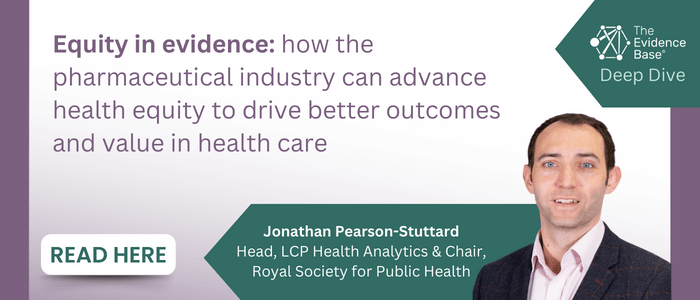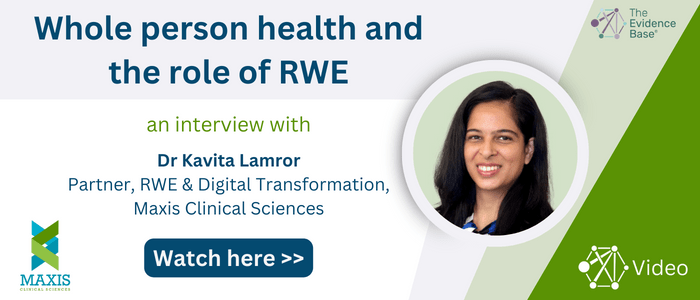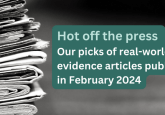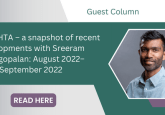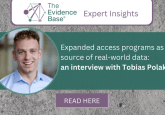ISPOR 2024 daily round-ups: Day 2
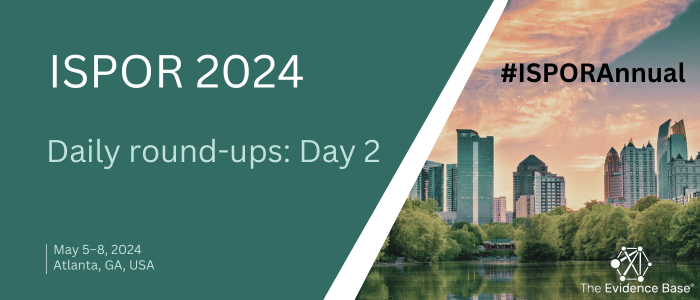
Throughout this week, The Evidence Base is bringing you updates direct from the ISPOR 2024 (May 6–8, 2024; Atlanta, Georgia, USA; #ISPORAnnual) conference! Here, we round-up some of the sessions from ISPOR 2024 Day 2.
Click below to read the coverage of Days 1 and 3.
Welcome address
President-Elect and incoming President, Eberechukwu Onukwugha (University of Maryland, USA), welcomed attendees to Day 2 of ISPOR 2024 by thanking outgoing President, Brian O’Rourke. Onukwugha announced the new Board of Directors (Elisabeth Fenwick [Open Health Group], Ramiro Gilardino [MSD International, Switzerland], Daniel Ollendorf [Institute for Clinical and Economic Review, USA] and Katja Rudell [Parexel International, UK]) as well as the newly-selected president-elect Uwe Siebert (UMIT TIROL – University for Health Sciences and Technology, Austria). There was also a touching tribute to Mike Drummond (University of York, UK) for his work and invaluable contribution to the field as the outgoing Editor-in-Chief of Value in Health. His successor, Nancy Devlin (University of Melbourne, Australia) and co-Editor-in-Chief, C Daniel Mullins (University of Maryland, USA) personally thanked Drummond for his support and dedication to ISPOR.
Plenary 2 – Missing Link for HEOR: A Path Forward for HEOR Data Integration
For a deep dive into Plenary 2, check out our full coverage. In this second plenary session of ISPOR 2024, moderator Nancy Dreyer (Dreyer Strategies LLC, University of North Carolina at Chapel Hill, and Picnic Health, USA) was joined by Niall Brennan (Centers for Disease Control and Prevention, USA), Joe Franklin (Verily, USA) and Keri Monda (Amgen, Inc., USA) to discuss “Missing Link for HEOR: A Path Forward for HEOR Data Integration”.
Spotlight session – Harmonizing Real-World Data Networks: Bridging Regulatory, Patient, and Research Perspectives
Keith Marsolo (Duke University School of Medicine, USA) introduced the session, explaining the different characteristics and design of globally available RWD networks. These include federated networks such as DARWIN EU and the FDA Sentinel Initiative as well as centralized, commercial networks exemplified by those provided by Truveta and Komodo Health. Marsolo noted the data quality issues shared across these issues and provided the example of PCORnet, highlighting the strategies they employ for mitigating data quality issues. Next to speak was James Wiggins (Amazon Web Services, USA) who shared the Observational Health Data Sciences and Informatics (or OHDSI, pronounced “Odyssey”), an open science community with over 3500 network of global data collaborators. Wiggins highlighted the OMOP common data model, which forms the foundation of OHDSI’s data network, and is used to standardize data by harmonizing structured patient health data sources, commonly EMR and claims data, leading to standardized results to support RWE research.
Joining remotely, Daniel Leaver Morales (European Medicines Agency’s [EMA], The Netherlands) provided an update on the EMA’s activities in generating RWE for regulatory decision-making, highlighting the challenges within Europe such as diverse data sources, data quality, representativeness and timeliness. Morales explained some the tools the EMA are to mitigate these challenges including data quality frameworks, DARWIN EU (utilizing the OMOP common data model to standardize results) and pre-prepared study catalogues of RWD studies to enable greater and faster access to data. Morales provide an update on DARWIN EU, sharing examples of some of the ‘off-the-shelf’ population-level epidemiology studies, which are carried out within a generic protocol.
Also presenting remotely, Donna Rivera (FDA, USA) built on the spotlight discussion by highlighting examples of RWD harmonization within oncology research for regulatory purposes at the FDA. Rivera reflected on the possibilities and challenges the FDA are facing in evidence generation, noting the complex data landscape within the US healthcare system with diverse data sources and quality making data harmonization a challenge. Rivera shared some of the FDA’s regulator research examples, including the Oncology Quality, Characterization, and Assessment of Real-world Data (QCARD) initiative aimed at improving RWD study design and data sources. Rivera closed by referring the audience to the new FDA and NIH co-developed glossary for clinical research that seeks to clarify definitions for 37 clinical research terms related to innovative clinical study designs, including studies using RWD to generate RWE for scientific, clinical, and/or regulatory decision-making.
Concurrent sessions
Day 2 of ISPOR 2024 included a wide range of concurrent sessions across the spectrum of HEOR research. Below are highlights of the session attended by Laura Dormer and Joanne Walker of The Evidence Base.
Issue Panel – Cookbooks Versus Blenders: Paradigms for Integrating Factors Relevant to the CMS Drug Price Negotiation Process
Continuing the discussion around Medicare drug price negotiation, in the morning, Steven Pearson (Institute for Clinical and Economic Review [ICER], USA) moderated a Issue Panel which included colleague Marina Richardson (ICER, USA) along with Robert Brett McQueen (Skaggs School of Pharmacy and Pharmaceutical Sciences, University of Colorado, USA) and Kyle Hvidsten (Sanofi, USA), considering the different approaches and frameworks that can be used in the CMS drug price negotiation process.
Pearson highlighted the various paradigms and uncertainties involved in this process, emphasizing the importance of understanding CMS’s intentions behind setting prices. To illustrate potential approaches, Pearson introduced the concepts of a “cookbook” and a “blender”. The “cookbook” represents a method where every factor is quantified and explicitly weighted, while the “blender” takes a more qualitative approach, considering various evidence and information without specific price adjustments.
Richardson spoke first, presenting a nuanced perspective on the “cookbook versus blender” debate. She argued for a partial cookbook approach, advocating for transparency, consistency, and predictability while maintaining flexibility. She used the example of ICER’s assessment of Eliquis as a model for informing initial offer prices, emphasizing the consideration of qualitative factors like comparators, unmet need, and clinical effectiveness.
Speaking next, McQueen leant towards the “blender” approach, advocating for a process incorporating both qualitative and quantitative factors, such as RWE, patient experience, and unmet need. He emphasized the need for transparency, consistency, and flexibility in CMS’s decision-making process, acknowledging feasibility concerns and the importance of patient/caregiver representation. Overall, he suggests a nuanced approach that combines elements of both the “cookbook” and the “blender”.
The third speaker Kyle Hvidsten, representing the pharmaceutical industry, advocated for a transparent and structured approach – the “cookbook”. He emphasized the importance of transparency in understanding the methods and findings of value assessments, urging for clarity on the basis of these assessments. He discussed the trade-offs involved in evidence generation and stressed the need for informed decision-making to serve patients effectively. Hvidsten also called for an understanding of the outcomes of the first round of negotiations before proceeding with the second round, emphasizing the urgency and importance of learning from the process.
ISPOR Forum – Incorporating Health Equity in HTA Systems and Research: A Global Perspective and Future Outlook
Moderated by Riku Ota (Novo Nordisk, Japan), the multi-stakeholder panel included Ataru Igarashi (Yokohama City University School of Medicine, Japan), Melanie Whittington (Tufts Medical Center [CEVR], USA) and Sreeram Ramagopalan (Health Analytics, Lane Clark & Peacock, UK). The session began with Ota discussing the increasingly important role of health equity in the development of new medicines. Ota provided an introduction to the ISPOR Health Equity Special Interest Group, which aims to advance equity-informative methods and data for HEOR that help to reduce unfair difference in health.
Igarashi, representing academia, echoed the increasing focus on health equity, with around 63 research posters presented at ISPOR 2024 referring to heath equity. Igarashi discussed several aspects of healthy equity research including incorporating health equity earlier on in cost-effectiveness analysis (CEA) analysis (equity-informative economic evaluation) and considering that health equity in research is a global factor.
Ramagopalan, providing the payer/HTA perspective, explained why health equity should matter to payers, reflecting on the global interest in health equity by papers to reflect a more holistic value of medicines. Ramagopalan stressed the need for increased RWD to understand the domains of equity, acknowledging the complexities within market access to identify these domains and challenges that exist.
Whittington concluded the panelist presentations by offering the US viewpoint, discussing the increased conversation around distributional cost-effectiveness analysis (DCEA) in value assessment in the US, providing suggestions to HTA, manufacturers, payers and-academics on how to use DCEA in informing health equity in their research. Whittington also praised recent work in the US on health equity, including the ICER white paper and the Innovation and Value Initiative (IVI) report.
You may also be interested in:
Exhibit Hall Theater – Innovative Strategies for Fit-for-Purpose RWE Research: Maximizing Data Completeness and Accuracy
Sponsored by Cardinal Health, the topic was presented by Richard Scott Swain and Danielle Gentile (Real-World Evidence and Insights, Cardinal Health, USA).
The presentation focused on maximizing data completeness and accuracy in real-world data collection, specifically in oncology. They discussed common challenges in RWD research, such as incomplete and inaccurate data, and highlighted the importance of addressing these challenges for meaningful analysis.
They presented a novel approach to data collection using physician-led chart reviews, which allows for more accurate and detailed data collection, especially in areas where traditional sources like claims and electronic health records may be insufficient.
They discussed case studies showing how real-world evidence complements clinical trial data. Standardizing endpoints using algorithms was emphasized for accuracy. During the Q&A session, they addressed questions about maintaining consistency across multiple sites in data collection, dealing with missing data, and the interaction with regulatory agencies like the FDA. They emphasized the importance of standardizing data collection methods and building trust with physicians to ensure accurate and reliable data. The Evidence Base will be providing a ‘deep dive’ into this session to be published on the site over the next few weeks, so be sure to register to be notified as soon as this is published.
Workshop – ‘Whole Health’ Value Assessment: Universal Survey Framework for Integrating Patient Experience Data in Health Technology Assessment
This afternoon workshop was moderated by Kimberly Westrich (National Pharmaceutical Council, USA), our regular Guest Columnist on The Evidence Base, and included Kayleigh Majercak (University of Maryland School of Pharmacy, USA), Robert Brett McQueen (Skaggs School of Pharmacy and Pharmaceutical Sciences, University of Colorado, USA) and Joe Vandigo (Applied Patient Experience, LLC, USA). Westrich set the scene by explaining the meaning and role of patient engagement in research and the ‘IAD’ framework – the active, meaningful and collaboration between patient and research across all stages of the research process where research decision making is guided by patients’ contributions as partners recognizing their specific experiences, values and expertise. Westrich touched on the diverse spectrum of value assessment approaches to patient engagement across the US, with minimal activity from NCCN, an evolving approach by ICER and ‘co-creation with patients’ route taken by IVI.
Majercak followed by introducing a disease-agnostic survey template to capture patient experience data that can be used to inform patient-centered outcomes measures and other patient-reported outcomes. The survey was co-developed with input from the patient community and value assessment stakeholders. This template was tested among individuals with asthma, multiple sclerosis, and colorectal cancer to create a standardized, patient-centric approach to surveys that represents the ‘Whole Health’ approach.
Vandigo emphasized the importance of patient experience data collection in value assessment and how this survey template could enhance value assessment and HTA efforts by quantifying patient insights and guiding the selection of value elements and assessment structures.
McQueen offered the ‘counter argument’ questioning the need for such modeling data that could be provided by the survey, with patient experience data already collected in various ways. McQueen went on to suggest potential strategies to increase uptake of universal survey instruments in value assessment within different contexts, highlighting the flexibility of the template to adapt to various assessment needs.
Issue Panel – I Have a Better QALY Than You: How to Make Sense of Alternatives to the QALY for Research and Policymaking
As the debate around the use of the quality-adjusted life year (QALY) continues, another highlight of the afternoon sessions on Day 2 was this issue panel moderated by Daniel Ollendorf (Tufts Medical Center [CEVR], USA). Panelists included Ollendorf’s colleague Melanie Whittington, Darius Lakdawalla (USC Leonard D Schaeffer Center for Health Policy and Economics, USA) and Anirban Basu (The CHOICE Institute, University of Washington, USA).
Whittington presented on the concept of equal value of life. She discussed its foundation in Eric Nord’s work over 20 years ago and explained how it assigns a quality of life weight to life extension interventions, aiming to provide a standardized measure. Whittington highlighted the development of equal-value life year (evLY), with a quality weight of 0.851. She emphasized the simplicity of the evLY and the ease of implementation in economic models, advocating for its relevance in policymaking due to its comprehensibility and lack of need for additional data. Whittington acknowledged both the strengths and limitations of the evLY, including its ability to value life extension equally and its potential for decision instability and circularity concerns.
Lakdawalla spoke next on the Growth Rate Adjusted Quality-Adjusted Life Year (GRACE). Using an audience poll, Lakdawalla demonstrated how GRACE reflects patient preferences more accurately and accounts for risk preferences and disease severity in a nuanced way. He argued that GRACE avoids discrimination against people with disabilities and offers a theoretically grounded framework for conducting distributional cost-effectiveness analysis. He emphasized the importance of accurately reflecting preferences in health economics.
Finally, Basu discussed health years in total (HYT). HYT attempts to address the biases inherent in QALYs while preserving the benefits of quality of life improvements from treatments. Basu explained how HYT allows for the separate valuation of life expectancy and quality of life, providing flexibility in decision-making and social welfare analysis. He highlighted the advantages of HYT, including its compatibility with existing quality of life weights. Basu also discussed the implications of HYT for health equity and concluded by emphasizing the need for further research and analysis to fully understand the implications and applications of HYT in health economics.
Educational Symposium – From Hype to Reality: Applications of Generative AI in HEOR and Market Access
Moderator Jag Chhatwal (Institute for Technology Assessment, Massachusetts General Hospital, Harvard Medical School, USA) welcomed attendees and was joined by a number of experts across the field offering different perspectives including Turgay Ayer (ValueGen.AI, Value Analytics Labs, USA), Sanatan Shreay (Cytokinetics, USA), Rachael Fleurence (National Institutes of Health, USA), Francesco De Solda (Johnson & Johnson, USA) and Ipek Ozer Stillman (Takeda Pharmaceuticals, USA). Chhatwal began the symposium by providing a background to generative AI and its increasing role in the pharmaceutical industry and across healthcare. Chhatwal likened the transformative potential of generative AI to the rise and fall of IBM’s Watson computer system, suggesting the lessons learnt from the failure should be applied to ensure the sustainability of generative AI. Audience polls indicated a diverse usage of generative AI, with the HEOR function valuing it the most to support evidence generation and health economic modeling.
Ayer focused on the impact of generative AI, outlining the limitations of general-purpose large language models (LLMs) in HEOR and market access and ways to address these issues through specialized AI models, such as ValueGen.AI.
Providing the manufacturers perspective, Ozer Stillman stressed the overall goal should be to ascertain ‘operational readiness’ and how LLMs can improve efficiency in content generation, such as literature synthesis and analysis of RWE, enhance engagement and communications and assist in decision-making.
Shreay echoed this approach, confirming a cautious and iterative approach should be taken to using and rolling out generative AI to ensure it remains a reality and not hype. Shreay shared a use case of generative AI in market access to understand country-specific gaps in clinical research outcomes.
Fleurence spoke about uses of generative AI in RWE, acknowledging its application across a range of concepts but with use-case specific benefits and limitations. Across all use cases, Fleurence stressed the importance of ‘human in the loop’ and evaluation frameworks to curate and validate any AI-assisted output.
De Solda closed by presenting a use case looking at comparing generative AI with traditional AI approaches to analyse social media posts to understand stakeholder perceptions of cure in prostate cancer.
On demand ISPOR 2024 sessions
For anyone who missed at ISPOR session or were unable to attend ISPOR 2024, ISPOR are providing a ‘Digital Conference Pass‘ option offering on-demand access to recordings of nearly all the educational sessions, plenaries, spotlights, and other content. Here are some of our highlights of the other sessions from Day 2 of ISPOR 2024 that can be access via the pass.
- The Next Generation of Observational Research: How Technology and AI Enable Research on “Whole Health” and a Better Patient Experience – Speakers: Nancy Dreyer and Kristen Hahn, PicnicHealth, USA
- Bridging Real-World Data and Regulatory Decision-Making: The Role of AI in External Control Arm Development – Discussion Leader: Paul Arora, University of Toronto, Canada
- Quantify to Qualify: A Quantitative Bias Analysis Workshop to Bust Bias and Drive Trustworthy Data-Driven Decision Making in Real-World Evidence – Discussion Leader: Stephen Duffield, National Institute for Health and Care Excellence, UK
- The Future of Data-Driven HEOR Decision-Making Powered by Generative AI: How Soon is Now? – Discussion Leader: Xiaoyan Wang, Intelligent Medical Objects, US
- Can Distributional Cost Effectiveness Analysis (DCEA) Actually Inform and Improve Health Equity in Oncology? Perspectives From the Methodologist, Physician, and Payer – Moderator: Jamie Grossman, Bayer Pharmaceuticals, US
- The Market Access Conundrum in Digital Health: Balancing Rapid, Robust Validation With Integrated Evidence Plans – Moderator: Terri Kim, Lunit, Inc., US
Our partners
For ISPOR 2024, The Evidence Base is working with several partners to bring coverage of their sessions and posters: Avalere, Cardinal Health, Flatiron Health, Genesis Research Group, Lane Clark & Peacock LLP and Medlior Health Outcomes Research. After the conference, we’ll be bringing deep dives and peeks behind the poster of research presented by these partners at ISPOR 2024. Register on The Evidence Base to receive regular updates and be notified when this coverage is published on the site.
Many thanks also to Maxis Clinical Sciences for their support and we welcome Carrot Recruitment, our new Talent Hub partner.

